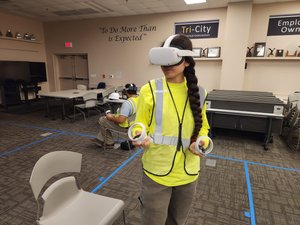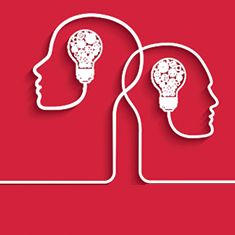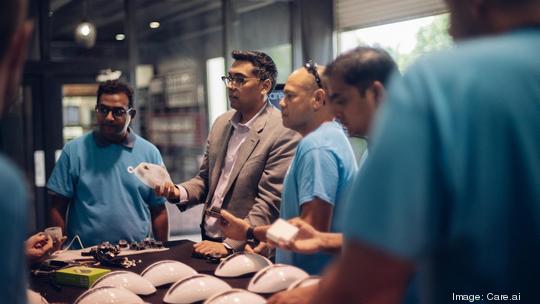
Artificial intelligence has existed for years, but hospital systems and health care providers have been slow to adopt the technology — something that’s expected to change in the next decade.
While most health care companies use AI or machine learning for cybersecurity or back-office operations, the technology now is poised to reshape the system by moving into areas such as diagnostics and patient care. As a result, the average budget allocation for AI spending at health care companies is projected to rise from 5.7% in 2022 to 10.5% in 2024, according to Morgan Stanley.
“The industry has yet to fully exploit AI’s potential to drive new revenue and boost efficiency,” the report said.
Why AI in health care matters
According to Statista, the AI health care market was valued at $11 billion in 2021 and is projected to spike to $187 billion by 2030. "That massive increase means we will likely see considerable changes in how medical providers, hospitals, pharmaceutical and biotechnology companies and others in the health care industry operate," said the site.
Outliers may be the earliest adopters
It could be that care centers faced with the most dire needs — worker shortages, for example — may be the first to integrate AI solutions across the board. Rural hospitals without a full staff are leaning on tech to find workarounds, said Shari Costantini, president of Orlando-based Kismet Technologies, an infection control company.
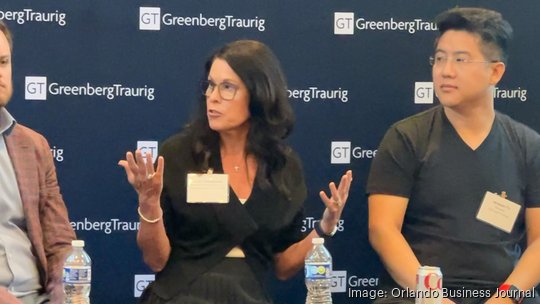
“We could see some level of AI where they would put in patient data and patient observations and send them to a collaborating tertiary care center,” she said.
Already, “if a nurse goes into the pharmacy to dispense some medication at night, they can turn on a camera that is virtually like telemedicine telemonitoring, and they can have a licensed pharmacist watch them dispense medication in the pharmacy,” said Costantini.
An Orlando-based testing facility is leading the way in trying and assessing new medical technologies powered by AI and other high-tech tools.
The National SimVet Center — a part of Veteran's Services — in southeast Orlando's Lake Nona community uses its 51,000-square-foot simulated hospital and staff of 60 to gauge devices, equipment and software and how those things will incorporate into an end-user's workflow. The center's work potentially has an impact on every living American veteran, since its findings are distributed to all care facilities for veterans.
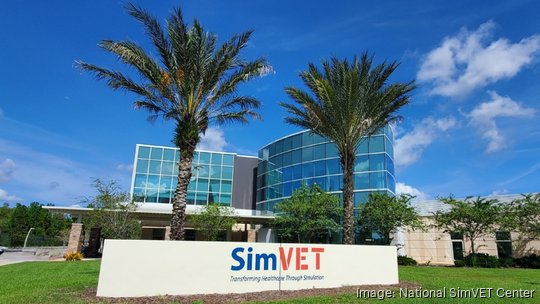
SimVet makes its recommendations to Veterans Affairs medical facilities in the U.S., Puerto Rico, Hawaii and some Pacific islands. "We have 171 medical centers, some with satellite locations, which adds up to a little over 1,000 actual sites of care," said family medicine specialist Dr. Scott Wiltz, the facility’s medical director.
Through recommendations from SimVET, sites as far afield as Juneau, Alaska, can become better resourced, better connected and better able to serve patients.
AI tools can ease human resource concerns
Further, AI can help hospitals better figure out how to schedule their typically limited staffs for optimum health care coverage.
“Hospitals’ staffing methodologies are still very antiquated. If they would use AI to look at trends over the years, they could be much more pinpointed in how to staff," said Costantini.
Costantini, who also is the founder and former CEO of Maitland-based staffing company Avant Healthcare Professionals, has seen heath care tech adoption lag time first hand and said AI can help hospitals get the right mix of full-time, part-time and per diem employees. “A lot of waste can be eliminated.”
There also are many other administrative applications for AI in health care.
For example, experts say natural language processing, which gives computers the ability to extract information and insights from documents, could be valuable for automating patient records and charts. The average U.S. nurse spends about 25% of their work time on regulatory and administrative activities — onerous tasks that reduce time spent directly with patients.
AI and machine learning will revamp patient record-keeping in the coming years, a change that will improve working conditions for doctors and nurses.
For instance, SimVet has tested AI-powered dictation software that "captures a conversation and actually turns it into a note for a patient’s file. It doesn't just transcribe the information, it turns it into clinician speak,” said Wiltz. “We tried it in inpatient spaces, outpatient spaces, the emergency department — we really stress-tested the system, introducing environments where there was a ton of background noise, things beeping and buzzing and multiple conversations going on to see if the technology would pick up the relevant conversation between the doctor and the patient, and it actually did really well."
Connected environments, smarter health care
Meanwhile, AI also can help keep patients safer and help fill other gaps left by human error.
For example, Orlando startup Care.ai deploys AI sensors in health care facilities — currently more than 1,500 sites including Oakland, California-based Kaiser Permanente and Tampa General Hospital, and signed recent partnerships with Brentwood, Tennessee-based Ardent Health Services and the UAE’s Emirates Health Services.
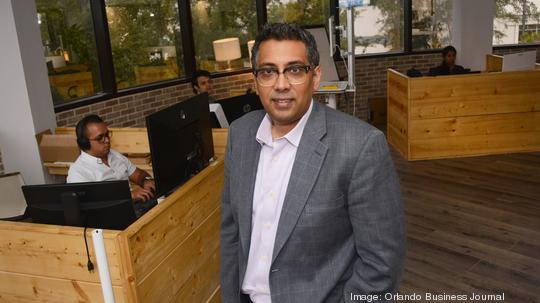
The neural network of sensors continuously monitors conditions, learning from behaviors. Collecting behavioral data over time, the care facility becomes smarter and more self-aware, automating many burdensome tasks. Real-time clinical and operational insights into behaviors and conditions allow for process improvements and optimized care.
Patient issues can be predicted and prevented, and mundane tasks can be automated to cut costs and ease burdens on health care workers, said Care.ai CEO Chakri Toleti.
It all started in 2018, when Toleti received a life-changing phone call that his mother had fallen in a hospital halfway across the world in India, and was lying on the floor for half an hour before her caregiver found her. He realized then that even the best medical professionals cannot be aware of everything happening in the care setting, and delays in responding to patient issues can have serious consequences. Following his mother’s accident, he asked, “Why don’t hospitals use ambient sensors to monitor patient safety?"
Advancements in diagnostics
Using AI to accurately diagnose and treat diseases also is a major focus for health care tech firms and startups. Google, for example, has partnered with medical companies to research new AI-enabled tools that improve the detection of skin, lung and breast cancers.
Fountain Life — a medtech firm headquartered in Lake Nona — offers “Apex” membership for $19,500 per year. Here’s what you get for the money: access to early-detection technology in the form of MRIs overlaid with AI technology, advanced treatment plans and concierge medical service.

"We do a whole body MRI as part of their assessment, looking for asymptomatic disease before it becomes symptomatic. There are about 10,000 images collected, and while the human eye is really good about reading some things and historically radiologists have read these scans and do a great job, the human eye cannot pick up the subtleties in some of these findings," said CEO Dr. Bill Kapp, an orthopedic surgeon.
"We use artificial intelligence to look at body composition, visceral fat, all kinds of different things, including very small areas that might be cancerous. These are things that are not found in a normal scan or a typical radiology suite because most radiologists aren't looking for asymptomatic disease or trying to detect patterns for asymptomatic disease for reversal."
Trust issues
Meanwhile, artificial intelligence is coming to hospitals and doctors’ offices, whether or not patients are ready for it.
Most Americans are unconvinced that AI will improve health outcomes in a significant way, according to a recent survey from the Pew Research Center. In fact, 60% of respondents said they would feel uneasy if their doctor relied on AI to diagnose ailments or recommend treatments, and 57% said they worried it would erode the relationship between patients and health care providers.
Confidentiality is another concern, with nearly 40% of respondents saying they worried more technology would put the security of their patient records at risk.
Despite those concerns, the respondents were able to identify some positive uses for AI. For example, almost half said they expected the technology would reduce the number of mistakes by medical providers.
It also could help reduce inequities in health care caused by racial or ethnic bias. More than 64% of Black adults in the U.S. report that bias based on a patient’s race or ethnicity prevents people from accessing medical treatment, Pew reported. Americans who are concerned about those barriers to care are among the most optimistic about the potential impact of artificial intelligence.
“Those who think it would improve the situation often explain their view by describing AI as more objective or dispassionate than humans,” Pew reported. “[Others] say AI would be blind to a patient’s race or ethnicity, and would not be biased toward their overall appearance.”
Sign up here for the Business Journal's free morning and afternoon daily newsletters to get the latest business news affecting Central Florida. For more business intelligence, follow us on LinkedIn, Facebook, Twitter and Instagram.



